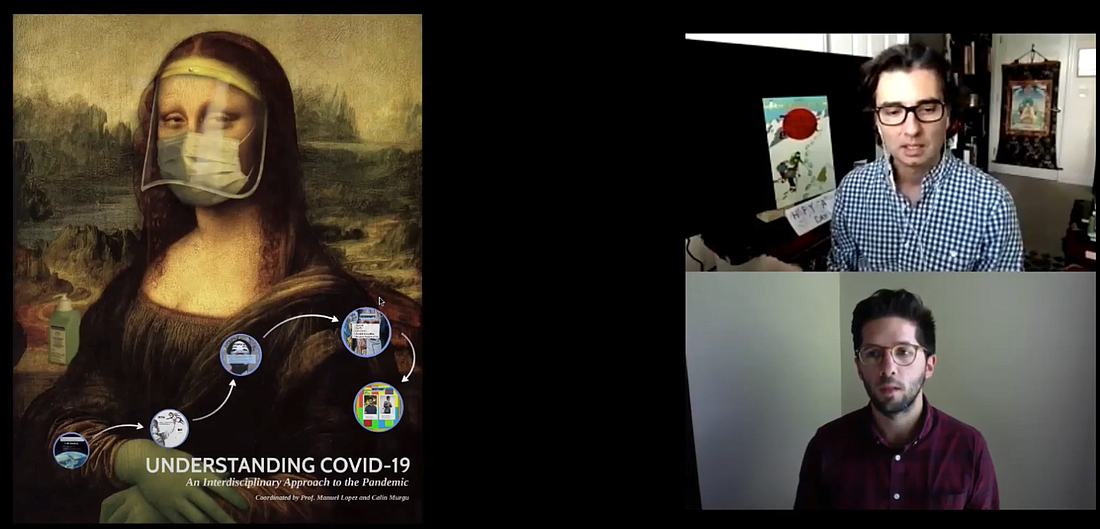- April 25, 2024
-
-
Loading

Loading

It’s likely the understatement of the new millennium, but the coronavirus pandemic is overwhelming.
It can be a lot to take in, especially as new information emerges every day. New College of Florida is looking to help with that, though: the school has launched an interdisciplinary course on COVID-19 that will attempt to cover the virus on almost every level.
The course will look at the pandemic from a historical, biological and sociological position as well as its effects on economics, politics, literature, religion, art and more.
“We are not doctors or nurses but we have knowledge in all of these divisions, departments and specialties,” said Manuel Lopez, assistant professor at New College and coordinator of the course, adding that a broad approach seemed to make sense.
It’s an immense undertaking. Lopez and fellow coordinator Cal Murgu have put together an interdisciplinary team of more than 20 instructors and faculty members to contribute to the course.
Lopez and Murgu were working on a different course at the onset of the pandemic and decided to nix their plans in favor of covering the virus. They reached out to faculty from the social and natural sciences, humanities and science programs to contribute. New College is also partnering with local organizations dealing with the virus to provide internships, and also bringing in local health care professionals to show how COVID is affecting Sarasota.
It’s important to Lopez that students understand the history of pandemics and how COVID is a momentous but recognizable phenomenon. That, in turn, may help students and participants from consuming misleading information.
“We’re not Harvard, we're not Princeton, but we have an immense source of knowledge within the local community,” Lopez said. “We wanted to make sure that we understood how the pandemic is affecting us on a local level.”
Lopez says staff plan to release the recorded lectures, as well as condensed 2-3 minute videos, online on a coming website as a public resource.
It’s not every day that Kristopher Fennie, an assistant professor of epidemiology at New College, has had to grapple with a pandemic in real time. COVID has presented Fennie with the real challenge of sifting through an immense amount of information and distilling it all into a digestible form for students.
Fennie will teach students how to study the number of cases over time as a way of better understanding outbreaks, a standard practice in epidemiology. He wants to bring in epidemiologsts and local health officials as part of a panel discussion to give a better idea of what it's been like to battle COVID day to day.
Something Fennie is looking forward to getting into is the social context of the pandemic.
"If you're in a position where you have to go to work, and you don't have the luxury of working at home, and you don't have a huge savings, you're going to be at higher risk because you're going to be exposed more," Fennie said.
A problem Fennie has been grappling with is seeing people grow frustrated with new and changing information.
Watching people turn away from science in favor of misinformation isn't exactly a new phenomenon — Fennie says convincing people to take new safety precautions is always a struggle.
"During the epidemic in 1918, you saw a lot of this dissent and disagreement, misinformation and so on," Fennis said. "It was kind of odd experiencing it, where people just don't believe the science."
When Lopez announced the comprehensive COVID course was looking for contributors, biology professor Tiffany Doan leapt at the chance.
The New College professor of five years was already teaching evolutionary medicine and modern plagues, so this felt like a perfect fit.
Doan is handling two lectures for the class. The first concerns evolutionary medicine, the way that viruses can change and involve and, importantly, how human action can shape that evolution. Safe sex practices helped slow transmission and curb the lethality of the HIV virus in the 1980s — Doan argues societal action could cause a similar change with COVID.
“It's been tested in HIV, it's been tested in cholera, it's been tested in a variety of diseases,” Doan said. “With COVID, we have seen a little bit of a little bit of differences in virulence … but we still have the same power that if we stop the spread, stop transmission, then the (viruses) that are left behind are going to be forced by natural selection to be less virulent.”
Her second lecture will dive into the history of vaccines, and how they are typically developed. Much of the lecture will include information on the work that went into developing a vaccine for SARS in the 2000s, as well as how different institutions and nations are racing to create reliable vaccines.
“I think there's 120 different vaccines being developed at the moment,” Doan said. “The best one will certainly be one that will cover all the strains, but I imagine that some of the ones that are being made right now are specific to one sort of strain or another.”